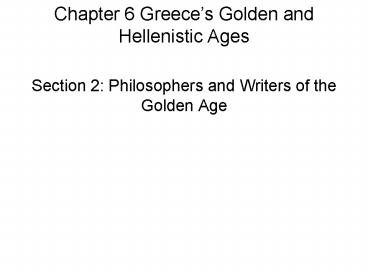Chapter 6 Greeces Golden and Hellenistic Ages - PowerPoint PPT Presentation
1 / 18
Title:
Chapter 6 Greeces Golden and Hellenistic Ages
Description:
As Greece entered its golden age, philosophers (lovers of wisdom) ... found guilty and executed. Death of. Socrates by Jacques-Louis David (French, 1748-1825) ... – PowerPoint PPT presentation
Number of Views:255
Avg rating:3.0/5.0
Title: Chapter 6 Greeces Golden and Hellenistic Ages
1
Chapter 6 Greeces Golden and Hellenistic Ages
- Section 2 Philosophers and Writers of the Golden
Age
2
Section 2 Philosophers and Writers of the Golden
Age
- As Greece entered its golden age, philosophers
(lovers of wisdom) and writers began to think
about the nature of the universe and of human
life. While the Greeks still honored the old
gods, they took pride in human accomplishments.
As the playwright Sophocles wrote, Many are the
wonders, none is more wonderful than what is man.
3
I. The Rise of Philosophy
- One of the Greeks greatest achievements
- was philosophy, the study of basic
- questions of reality and human existence.
- Philosophers believed the world is based
- on natural laws, or truths, which can be
- discovered through reason
4
A. Socrates
- One important philosopher was Socrates, who
- challenged students to test their own values
- and ideas
Socrates (469-399 B.C.E.)
5
A. Socrates
- Accused of denying the existence of the gods
- and corrupting Athenian youth, Socrates was
- found guilty and executed
Death ofSocrates by Jacques-Louis David (French,
1748-1825)
6
B. Plato
- A student of Socrates was Plato, a young
- aristocrat who founded the Academy for
- teaching philosophy
Plato (427-347 BCE)
7
B. Plato
- Plato believed all things were imperfect
- expressions of perfect universal forms.
- Human beings consisted of two parts, the body
- and the soul
8
C. Aristotle
- One of Platos students, Aristotle, founded his
- own school
Aristotle (384-322 BCE)
9
C. Aristotle
- Aristotle collected facts and organized them
- into systems, establishing the foundations for
- anatomy, botany, and zoology
Aristotle's Scheme of Matter
10
II. Mathematics, Medicine, and Science
- The Greeks explained the world in terms of
- natural laws that could be observed and
- defined rather than as the work of gods
11
A. Pythagoras
- Pythagoras was a philosopher who believed
- that everything could be explained in terms of
- mathematics
12
B. Hippocrates
- Hippocrates, the founder of medical science,
- wrote medical studies based on observation,
- experiment, and experience
Hippocrates c.460 BC - 377 BC
13
B. Hippocrates
- He taught that disease comes from natural
- causes, not as punishment from the gods, and
- advocated rest, fresh air, and a proper diet
Walking is man's best medicine. As to
diseases make a habit of two things - to help, or
at least, to do no harm. There are in fact two
things, science and opinion the former begets
knowledge, the latter ignorance. Healing is
a matter of time, but it is sometimes also a
matter of opportunity. Prayer indeed is
good, but while calling on the gods a man should
himself lend a hand. A wise man should consider
that health is the greatest of human blessings,
and learn how by his own thought to derive
benefit from his illnesses.
14
C. Herodotus
- Herodotus was the Father of History
- Thucydides believed that studying the past
- helps us understand human nature
Herodotus 484 BC-ca. 425 BC
Thucydides 460 - 404 BC
15
III. Greek Theater
- Greek writers produced great works of
- literature and developed many of the literary
- styles in use today
The Large Theater in Pompeii was built in the
usual Greek fashion which utilized the natural
slopes of a hillside. The theater could
accommodate 5,000 people. An enormous cloth
canopy was used to protect the audience from the
sun and wind.
16
A. Drama
- Athenian writers were the first to write
- dramas - plays containing action, dialogue and
- involving conflict and emotion
Greek Chorus
17
B. Tragedies
- Sophocles defended traditional Greek values
- while Euripides questioned many old beliefs
- and ideas
Sophocles 496-406
B.C.E.
Euripides c. 480
406 BC
18
C. Comedies
- Aristophanes poked fun at Socrates and used
- comedy to make Athenians think about the
- causes and effects of war
Aristophanes c. 448 BC-380 BC































